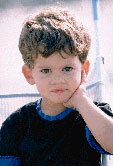
WEDNESDAY, Jan. 22, 2014 (HealthDay News) — Children who experience the death of a family member are at slightly increased risk for psychotic illnesses such as schizophrenia later in life, a large new study reveals.
The risk is highest among children who had a sibling or parent commit suicide, according to the findings published Jan. 21 in the online edition of the BMJ.
Researchers analyzed data from nearly 947,000 children born in Sweden between 1973 and 1985. Of those children, 33 percent experienced the death of a family member before they reached age 13. More than 11,000 children were exposed to death from suicide, more than 15,000 to death from accidents and more than 280,000 to death from natural causes.
Among those who experienced the death of a family member as a child, 0.4 percent developed a non-affective psychosis (not related to emotions or mood) such as schizophrenia. In addition, 0.17 percent developed a so-called affective psychosis, such as bipolar disorder with psychosis and depression with psychosis, according to a BMJ news release.
Overall, there was an increased risk of psychosis among people who suffered a death in the family during childhood and the risk increased the earlier in childhood the death occurred, the news release said. The greatest risk was seen in those who experienced the death of a family member when they were aged newborn to 3 years old.
The researchers said the increase was small but “significant.”
In terms of type of death, the risk of psychosis was highest among those exposed to suicide in the immediate family, followed by those exposed to death from accidents, and then those exposed to deaths from natural causes.
“Our research shows childhood exposure to death of a parent or sibling is associated with excess risk of developing a psychotic illness later in life,” Kathryn Abel, a professor from the Center for Women’s Mental Health at the University of Manchester, in England, said in the news release.
“This is particularly associated with early childhood exposure,” Abel said. “Further investigation is now required and future studies should consider the broader contexts of parental suicide and parental loss in non-Western, ethnically diverse populations.”
While the study found a slight increase in the risk of developing a psychotic illness among children exposed to death of a family member, it did not prove a cause-and-effect relationship.
More information
The U.S. National Institutes of Health explains how to talk to children about death.
Copyright © 2026 HealthDay. All rights reserved.

